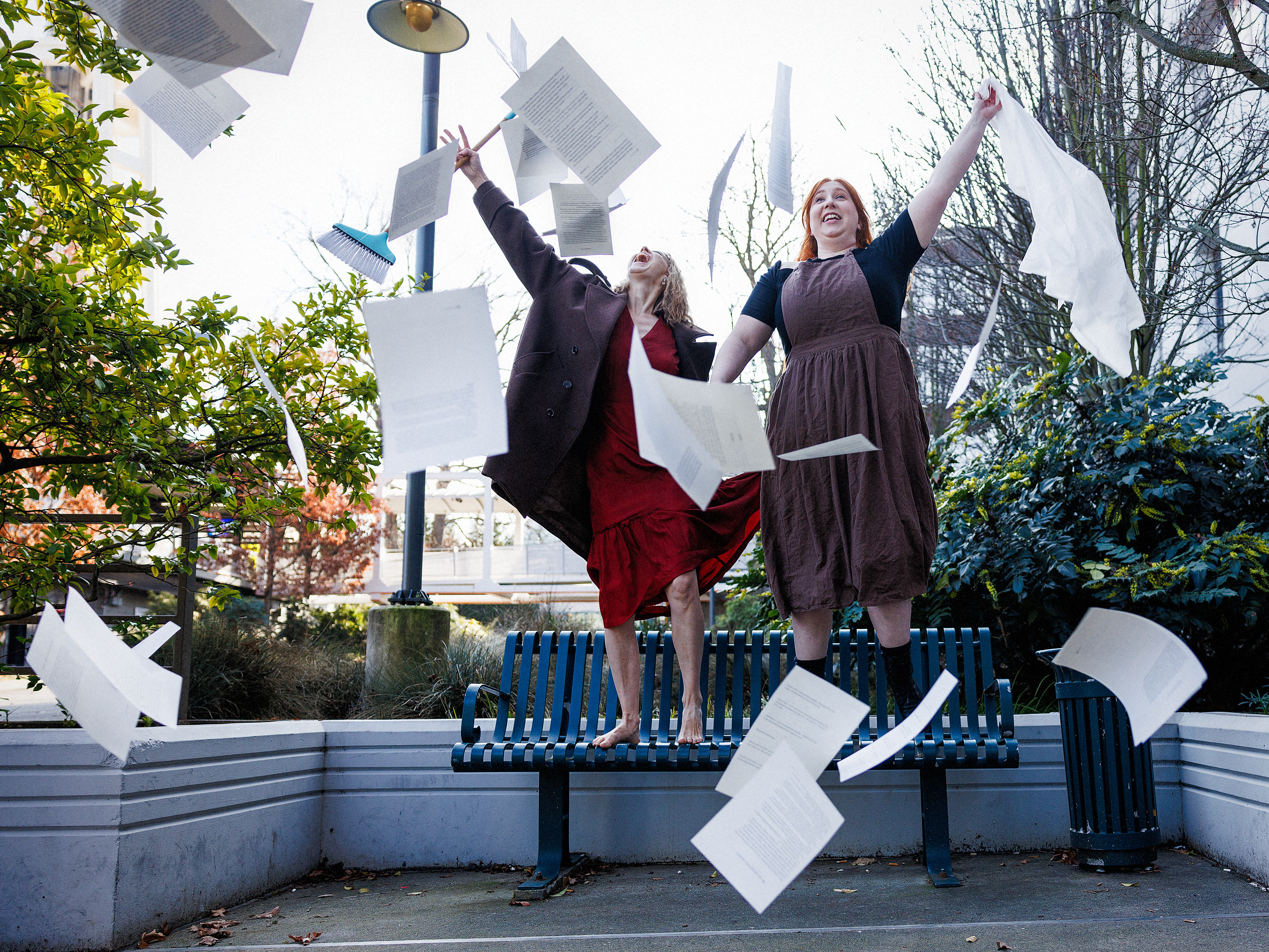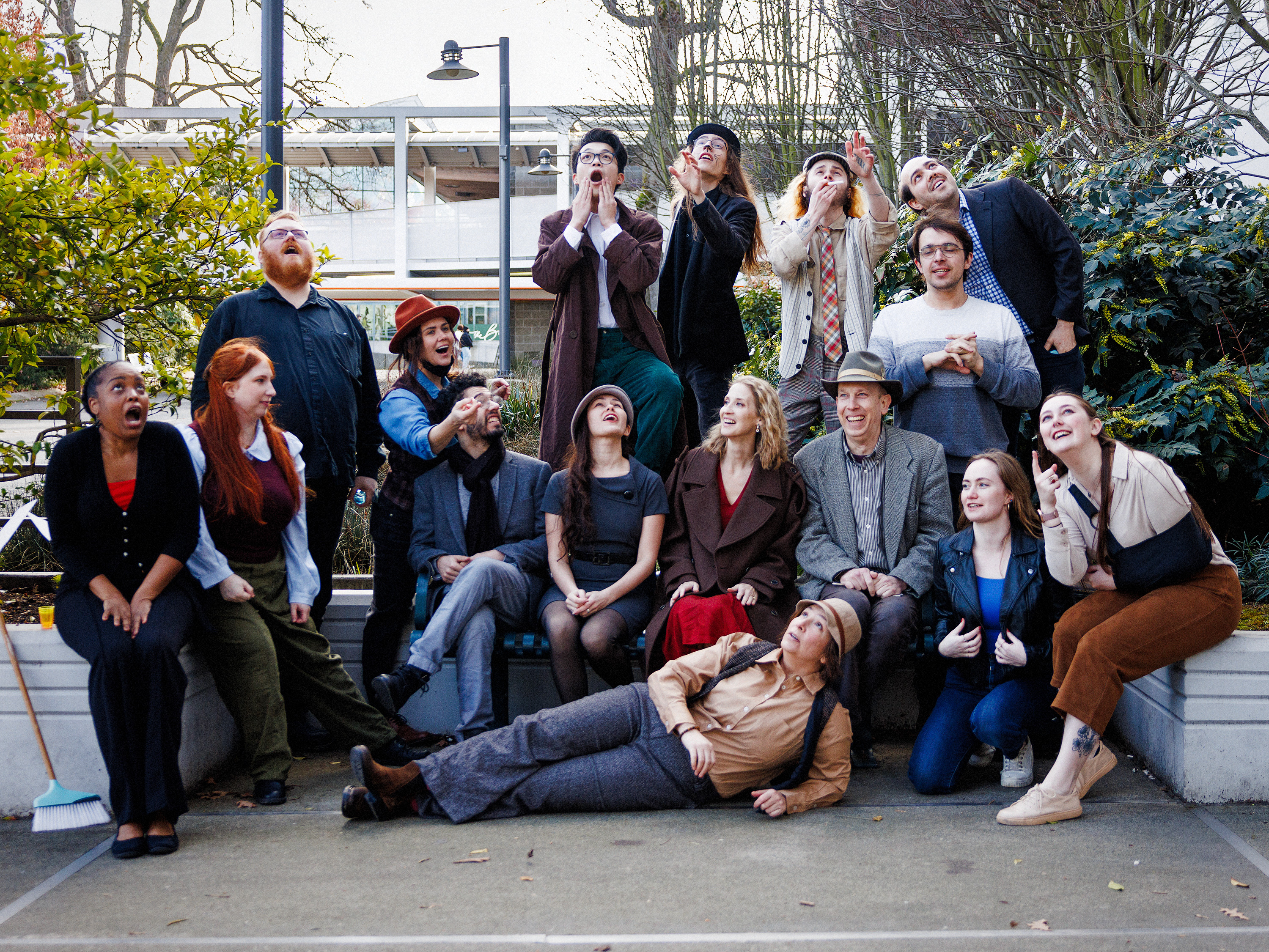Sacrifice and Salvation: A Retelling of The Master and Margarita
A Review of The Master and Margarita at Dacha Theatre
Written by TeenTix Newsroom Writer Zunairah Karim and edited by Teen Editorial Staff Member Aamina Mughal

The devil himself orchestrates chaos in the heart of 1930s Moscow in Mike Lion’s adaptation of Mikhail Bulgakov's The Master and Margarita presented by Dacha Theatre. This adaptation, staged at 12th Avenue Arts, delves into the philosophical dichotomies of good and evil, exploring their coexistence against the tumultuous backdrop of the Soviet Union. This production shows the power of theater by bringing complex philosophical narratives to life, inviting both newcomers to the story and fans of the original novel to engage with its depth.
The Master and Margarita uses magical realism and gothic elements to challenge societal norms and present deep philosophical questions. Set in a time when atheism was state policy, the story starts with the arrival of Professor Woland, the devil in disguise, and his eclectic entourage, who set Moscow ablaze with events that peeled back the layers of hypocrisy and corruption embedded within society.
The play incorporates the parallel narratives of the Master, a writer overcome by rejection and loss, and Margarita, his muse, whose undying love and sacrifice become their salvation. Additionally, the play discusses life lessons through the story of Pontius Pilate, the Master’s book. This production ambitiously seeks to dissect the interplay between good and evil, alongside the power of redemption and the sacrifices made in the name of love. Margarita faces her fear of the Devil for the chance to be with her love in the afterlife. She chooses to give up her wish the Devil grants her to help another, choosing to do a good deed with the help of evil. With minimal yet expressive set and costume designs, this production masterfully explores deep philosophical questions and societal critiques, using light and shadow to enhance the magical realism and gothic elements of the narrative.

The production's minimalist set design, managed by Robin Macartney, noticeably contrasts the narrative's complexity. While this allows for emphasis on the actors' performances and the story's verbal narrative, this choice sometimes leaves viewers lost on the storyline and whether this regards the Devil’s affairs, the Master and Margarita love story, or Pontius Pilate’s lessons. Ultimately, the simplicity of the set occasionally challenges audience members' ability to seamlessly navigate the complex narrative threads without visual cues to guide them but also emphasizes the interactions between the actors. The production's use of lighting, however, orchestrated by Sara Staven, skillfully manipulates shadows and illumination to demarcate moral dualities, attempting to fill the gaps left by the set's minimalism. The ancient Jerusalem segments long for more vivid visual distinction from the Moscow scenes to underscore their thematic significance. The costumes and props, designed by Fantasia Rose and Olivia Dagley, bring a visual authenticity to the characters, contributing significantly to the overall mood and helping to anchor the story's ethereal components in a tangible reality. The technical aspects, while modest, are thoughtfully executed, aiming to complement rather than overshadow the narrative’s philosophical ponderings.
The ensemble, a mix of Dacha Company Members and others, navigates the story’s intricacies and breathes life into the narrative. Ksenia Boisvert's portrayal of Margarita is a whirlwind of passion and determination, capturing the essence of a woman ready to traverse the depths of the underworld for love. In exchange for a wish, she becomes the hostess for the Devil. While disturbed by the people she meets, she stays, facing her fear, to be with her love. Ben Symons, as the Master, embodies the tormented soul with a performance that resonates with anyone who has ever faced rejection or despair while he recounts his story. He walks around as though he is lost, never makes eye contact with a character, and speaks fast, which all are signs of nervousness and torment. His torment could be felt from the stands, impacting the feelings of anyone who watches. Cody Smith’s portrayal of Woland, with a balance of menace and charm, captures the devil's complex nature, offering a glimpse into the mysterious forces that drive the narrative forward. In the end, he has no remorse for the deaths he caused, but also only targets those he believes deserve it. For example, one of his victims is the head editor of a newspaper who is the reason for most of the Master’s torment. Through these performances, the production succeeds in making a timeless literary work accessible and relevant, inviting audiences to reflect on their interpretations and the broader implications of the story in today's context.

The Master and Margarita at Dacha Theatre is more than a theatrical production; it is an immersive experience that invites the audience to explore Bulgakov’s themes of morality, freedom, and love. The simplistic set design emphasizes actor interactions but sometimes muddles narrative clarity, while the lighting, costumes, and props enhance the visual storytelling. The ensemble delivers a captivating performance that highlights the complex interplay of good and evil, love, and artistic integrity, successfully bringing Bulgakov's profound themes to life on stage. The Dacha Theatre's adaptation of The Master and Margarita masterfully honors Bulgakov’s work, offering a deep, artistic exploration of its themes. Dacha Theater was ultimately able to bring this story of human complexities to those with no experience with philosophical Russian fantasy novels like the original, The Master and Margarita.
Lead Photo Credit: Brett Love
The TeenTix Newsroom is a group of teen writers led by the Teen Editorial Staff. For each review, Newsroom writers work individually with a teen editor to polish their writing for publication. The Teen Editorial Staff is made up of 5 teens who curate the review portion of the TeenTix blog. More information about the Teen Editorial Staff can be found HERE.
The TeenTix Press Corps promotes critical thinking, communication, and information literacy through criticism and journalism practice for teens. For more information about the Press Corps program see HERE.

